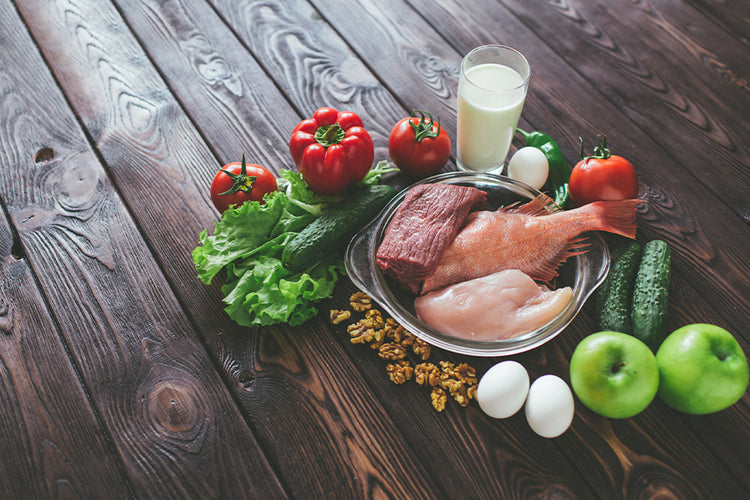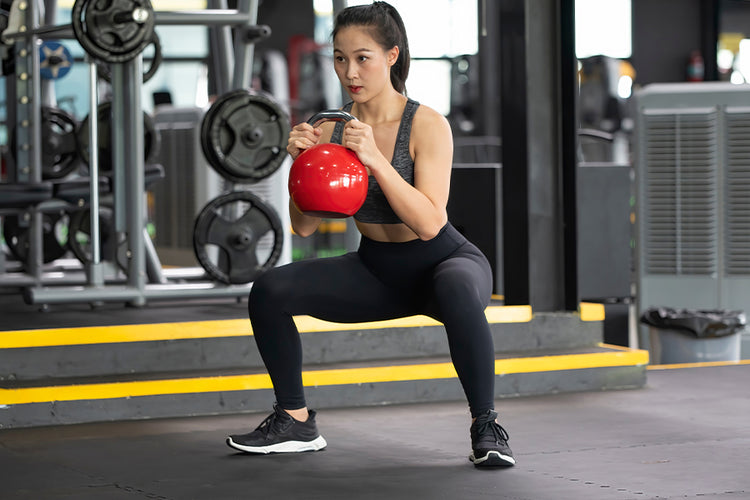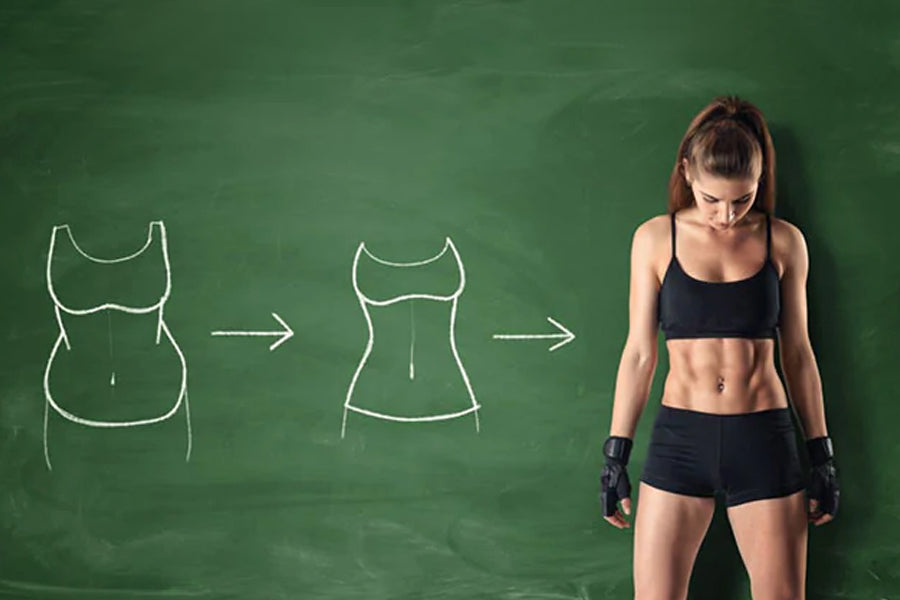Raise your hand if you've ever stepped on the scale and immediately regretted every carb you've eaten. Don't worry; you're not alone in this weight-obsessed culture.
Toiling away on the elliptical, tracking every calorie and keeping a strict eye on the scale is what many individuals go through to see some progress. If this describes your situation, don't worry - you're not alone. You're in the majority. According to a study, around 80% of people who start a fitness program do so to lose weight.
We all know the feeling of triumph when you step on the scale and see you've lost a few pounds. But have you ever wondered what exactly you're losing when those numbers go down? Is it just fat? Is it muscle? Or is it water weight? Let us enlighten you.
Two terms are often used interchangeably weight loss and fat loss. While they might seem the same thing to you, they are not. Weight loss is simple - you lose the total weight (fat, muscle, water, etc.).
Fat loss, however, refers to the specific loss of only body fat. And unfortunately, people are often focused on numbers on the scale rather than fat loss. Why is this a problem? Because when you lose weight, you're not necessarily losing all fat. You might even be losing more muscle than fat! And this is a problem because muscle is critical to burning calories and maintaining a healthy weight.
So next time you step on the scale, don't get too excited or discouraged by the number you see. Focus on your body composition instead: are your clothes fitting better? Do you have more energy? Can you notice any change in your body shape? These are the actual indicators that matter, not the number on the scale.
And now that we have understood the importance of knowing what you are shedding off let's discuss their differences in detail.
Related Article: Want to Lose Weight Naturally? Discuss Some Important Tips!
Difference Between Weight Loss and Fat Loss

For many of us, weight loss conjures images of deprivation and grueling workouts. But it doesn't have to be that way! Weight loss means a decrease in overall body weight. A lot has been said about weight loss and fat loss. An international yoga teacher Rebecca Pacheco, who is also an author and fitness trainer, famously quotes that:
"The difference between weight and fat loss is like between motion and progress. Weight loss can be achieved by simply removing water from your body, while fat loss requires a lifestyle change."
~Rebecca Pacheco
It can be from losing water, muscle, glycogen, or all three. You don't want to lose muscle, as keeping your metabolism up and burning calories is essential. Retaining muscle reduces your risk of age-related muscle mass, resulting in potential disability.
So, if you're willing to lose weight and keep it off, you want to ensure you're not losing too much muscle mass. On the other hand, fat loss is an entirely different story. Fat is what we want to lose when trying to slim down, but it's also the hardest to eliminate. When you lose weight, your body will first burn through all glycogen stores (just stored sugar) before breaking down fat cells for energy.
That's why it's so important to exercise regularly and eat a healthy diet when trying to lose fat since your body needs to be in a calorie deficit to break down those pesky fat cells. Fat loss has several benefits, including improved insulin sensitivity, lower blood pressure, and reduced inflammation. Plus, knowing you're shedding those excess pounds for good feels good!
How to Measure Fat Loss?
The vast majority want to lose fat, not muscle. That's because muscle is active tissue that burns calories even when you're at rest, while fat is inert. So how do you make sure you're losing fat and not muscle? Unfortunately, there's no easy answer.
Let's not just look in the mirror and tell; body weight alone isn't a reliable indicator either since muscle is denser than fat and weighs more. Your body fat percentage is the best way to assess whether you lose fat or muscle. It can be done using calipers or special devices that use electrical impedance.
Once you get into body fat percentage, you can re-measure every few weeks to see if it's going up, down, or staying the same. If it's going up, even if your weight stays the same or goes down, you're losing muscle and gaining fat, which is not what you want.
Of course, these are just standard guidelines - everyone is different, and many factors can affect body composition. But measuring your percentage is the best way to track whether you're losing fat or muscle.
You can escalate the fat loss process by combining your diet with a fat burner supplement by DMoose. The DMoose Fat Burner offers a unique formula to help you healthily lose some inches off your waist. It expedites metabolism, reduces cravings, and lowers stress levels within weeks. Isn't it what you are looking for?
Related Article: A 12-Week Fat Destroyer: Complete Fat Loss Workout & Diet Program
How to Lose Weight While Maintaining Muscles?
Losing weight while maintaining muscle mass can be challenging, but it's an important goal to set for yourself if you want to be healthy and fit. Let's dive in and find ways to lose weight while maintaining muscle mass.
Protein Rich Diet

Everyone knows protein is crucial for building and maintaining muscle mass. But did you know that consuming lots of protein can also help you lose weight? Unlike other nutrients, protein requires extra energy to digest, meaning more calories are burned by consumption. Plus, it helps preserve precious muscle mass - which is essential for weight maintenance and looking good.
But wait, there's more! Protein keeps you satisfied for a long, curbing pesky appetite and preventing overindulgence. So what are you waiting for? Load up on the protein and let the calorie-burning begin! Calling all you over-50s out there - a high-protein diet is your new best friend! Not only can it keep your precious muscles, but it also promotes shedding those pesky fat stores.
We know it's tough to maintain a healthy body, but fear not - the recommended intake for your age bracket is only 0.68 grams per pound (1 gram per kg) of body weight per day. Time to beef up that protein intake, folks!
Exercise

Want to shed some pounds? Well, the key is to start moving - it's that straightforward. But hold your horses we're not talking about physical activity. What you opt to do and how much depends on your fitness level and goals. Let's get sweating and figure out the best exercise plan for you!
For instance, to lose weight, you should focus on cardio, such as running or biking, for 150-300 minutes per week. These exercises help to burn calories and speed up your metabolism.
Attention, all you old-timers with extra fluff! Want to keep your muscles from turning to mush? Listen up. A recent review shows that hitting the gym for some cardio and weight training at least three times a week while watching your diet can help you retain a whopping 93% more muscle than your lazy peers.
It's time to pump some iron and say goodbye to saggy skin! Strength training is also crucial, as it helps maintain muscle mass while losing weight. And finally, be sure to add a healthy diet into the mix! Workout is essential for weight loss, but it's not the only puzzle piece.
Eating healthy foods can boost your metabolism and keep your energy levels up. And if you are searching for a supplement that can increase your metabolism without affecting your immunity, the DMoose Probiotic 50 Billion CFU is the best choice.
It improves skin condition and aids in weight loss while overcoming fatigue. So, grab yours before it is gone!
Calorie Restricted Diet

Losing weight can be a workout in itself, with so many choices for slimming down. But if you don't want to sacrifice your hard-earned muscles, a reduced-calorie diet is your answer. It's the key to dropping pounds without dropping gains.
Sick of munching on celery sticks and chasing them down with a gallon of water? Switch to a reduced-calorie diet and let your body do the work! With fewer calories, your body will start to burn stored fat for energy, giving you that lean and mean look you've been craving.
Plus, bonus points for the fact that muscle is denser than fat, meaning you'll be shedding pounds left and right. Say goodbye to bland diets and hello to a healthier, happier you. Opt for lean proteins, fruits, vegetables, and whole grains - the good stuff that will keep you sated without packing on the extra pounds.
Related Article: Basal Metabolic Rate: Better Than Math When Calculating Calories Needed to Lose Weight
FAQs
1. Can you lose fat and not lose weight?
Weight is a measure of all the tissue in the body, including fat, muscle, bone, and water. So it's possible to lose fat without losing weight if you replace it with muscle. And it's possible to lose weight without losing fat if you lose water weight. In short, don't assume that someone who has lost a lot of weight has also lost a lot of fat.
2. Where does the fat go when you lose weight?
The weight loss process is complex and involves several different processes. First, when you eat fewer calories than you burn, your body breaks down stored fats for energy. This process is known as lipolysis. The fats are broken down into smaller units called fatty acids, which can be used for fuel. However, not all fatty acids are used for energy. Some are excreted as waste products, such as carbon dioxide and water.
3. How much water weight do you lose before losing fat?
Everybody is different and, therefore, will lose water weight at different rates. Few people may see results almost immediately, while others may lose a significant amount of water weight before seeing any change in their body fat percentage. Every little bit counts; eventually, those pounds will start dropping off.
4. Why do I look thinner but weigh more?
The answer has to do with two things: body fat percentage and muscle mass. And since muscle is denser than fat, it weighs more. So even though you may have lost pounds, you may not have lost much body fat. You may have even gained some muscle mass, which would explain why you look thinner but weigh more.
Bottom Line
It's not just about stepping on a scale and calling it a day to lose weight. Now you must know the difference between weight loss and fat loss. Weight loss means your overall body weight is decreasing, but fat loss is specifically shedding fat mass.
Use calipers to measure your waistline to ensure you're on the right track. Remember that you want to keep that precious muscle mass while slimming down. To prevent that, ensure you're eating sufficient protein and reducing calories. Remember to get that body moving with some healthy physical activity!
Reading List
Article Sources
- Management, Institute of Medicine (US) Subcommittee on Military Weight. Weight-Loss and Maintenance Strategies. National Academies Press (US), 2004. www.ncbi.nlm.nih.gov, https://www.ncbi.nlm.nih.gov/books/NBK221839/
- McMurray, Robert G., et al. "Examining Variations of Resting Metabolic Rate of Adults: A Public Health Perspective." Medicine and Science in Sports and Exercise, vol. 46, no. 7, July 2014, pp. 1352-58. PubMed, https://doi.org/10.1249/MSS.0000000000000232
- Dhillon, Robinder JS, and Sarfaraz Hasni. "Pathogenesis and Management of Sarcopenia." Clinics in Geriatric Medicine, vol. 33, no. 1, Feb. 2017, pp. 17-26. PubMed Central, https://doi.org/10.1016/j.cger.2016.08.002.
- Kim, Jung Eun, et al. "Effects of Dietary Protein Intake on Body Composition Changes after Weight Loss in Older Adults: A Systematic Review and Meta-Analysis." Nutrition Reviews, vol. 74, no. 3, Mar. 2016, pp. 210-24. PubMed Central, https://doi.org/10.1093/nutrit/nuv065
- Sardeli, Amanda V., et al. "Resistance Training Prevents Muscle Loss Induced by Caloric Restriction in Obese Elderly Individuals: A Systematic Review and Meta-Analysis." Nutrients, vol. 10, no. 4, Mar. 2018, p. 423. PubMed Central, https://doi.org/10.3390/nu10040423
- Longland, Thomas M., et al. "Higher Compared with Lower Dietary Protein during an Energy Deficit Combined with Intense Exercise Promotes Greater Lean Mass Gain and Fat Mass Loss: A Randomized Trial." The American Journal of Clinical Nutrition, vol. 103, no. 3, Mar. 2016, pp. 738-46. PubMed, https://doi.org/10.3945/ajcn.115.119339
- Hernández-Reyes, A., et al. "Changes in Body Composition with a Hypocaloric Diet Combined with Sedentary, Moderate and High-Intense Physical Activity: A Randomized Controlled Trial." BMC Women's Health, vol. 19, Dec. 2019, p. 167. PubMed Central, https://doi.org/10.1186/s12905-019-0864-5.














